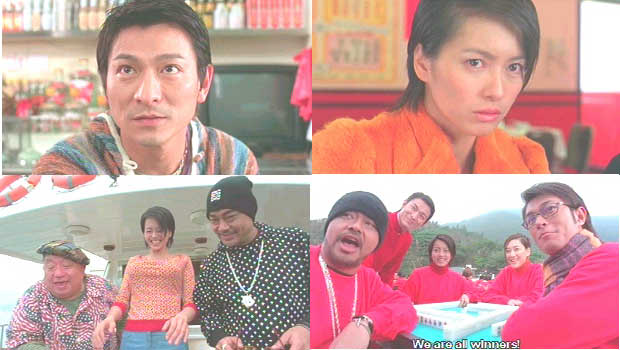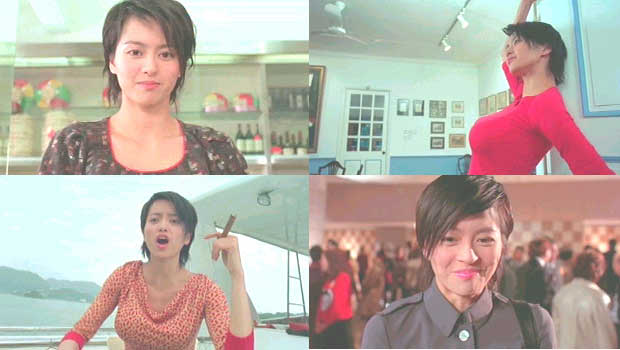Fat Choi Spirit

Reviewed by YTSL
Early on in this Milkyway Image production, the
assertion is made by Bonnie Wong’s patently not entirely lucid thinking character
that: “Everyone knows how to play mahjong”. When viewing this mahjong
game oriented Chinese New Year comedy whose stellar cast includes Andy Lau
Tak-Wah, Gigi Leung Wing-Kei (who looked to have had a ball playing one of
the eccentric individual filled work’s more oddball personalities -- a woman
with not only a major temper but also a pretty intense desire to become the
wife of the movie’s main man), Lau Ching Wan, Louis Koo Tin-Lok and Cherrie
Ying Choi-Yi (all of whom either play characters who have the same name as
those who play them or ones which do not get mentioned over the course of
the entire movie!), it sure can seem this way.

As many Western Hong Kong filmophiles can undoubtedly attest though, this
actually is not the case in real life (or, especially, in territories that
are not like Hong Kong in having a predominantly ethnic Chinese population).
Over the course of leafing through the many reviews of FAT CHOI SPIRIT on
the HKMDB, however, I found -- with some surprise -- that a lack of knowledge
re what it means when mahjong players yell out such as “pong” (i.e., to denote
that they have a “hand” that contains a three of a kind set of tiles), “kong”
(i.e., to announce their having come by all four of a same designed tile)
and “self touch” (i.e., to point out that they have won a game by independently
drawing a winning tile rather than by way of accepting one thrown out by
another player) have not prevented a number of folks from having enjoyed
their viewing of this Johnnie To and Wai Ka Fai co-produced cum -directed
movie.

For the most part, I was glad to learn that this was so for them since I
do reckon (too) that FAT CHOI SPIRIT -- as surely can be discerned by way
of its most villainous character being a self styled “Master of Mahjong”
who turns out to be a con artist, dresses like a rapper, acts like a big
baby, has a father portrayed by Wong Tin Lam, and is happily overplayed by
Lau Ching Wan -- is one very fun filled effort. Nonetheless, this (re)viewer
-- who (no, I really am not trying to rub it in!) was taught how to play
mahjong by her mother when she was about four years old... -- feels obliged
to state that a significant portion of the considerable pleasure that she
personally derived from viewing this breezy movie stemmed from her being
able to “read” the mahjong tiles and hands that are frequently on prominent
display in this light hearted offering.

For one thing, this “reading” facility was what allowed me to appreciate
and consequently marvel at the sight of “hands” that held rare as well as
special configurations like “13 Unique Wonders” and “Heaven’s Grace”.
For another, it was needed to fully recognize how terrible were some of the
“hands” that FAT CHOI SPIRIT’s Mahjong Warrior protagonist -- drew during
his cursedly unlucky period. Additionally, for all of this rather loosely
structured effort’s apparently containing plenty of visual, verbal and musical
cues that give non-mahjong playing viewers some idea re what’s going on in
a game (and the festive film as a whole), they cannot help but miss out on
really understanding why one way to lose as well as win is different -- and
either more costly or profitable -- from another.

When coupled with the abundance in this Wai Ka-Fai, Yau Nai-Hoi and Au Kin-Yee
scripted work of such “in-jokes” as Andy Lau’s constantly swigging a brand
of tea that he is the celebrity spokesman for in Hong Kong along with the
sudden throwing out of a spoofy “Once Upon a Time in China” visual and verbal
reference at one point in the offering, FAT CHOI SPIRIT can appear to be
one of those films that seems to have gone out of its way to penalize those
of its viewers who are not familiar with Hong Kong society and cinema as
well as Chinese culture. Alternatively, there might be some truth to
the suggestion that even those who do not realize that the “mop head” that
Gigi Leung temporarily sported -- while appearing as a tax bureau official
-- looks to have been deliberately similar to that which adorns the head
of Regina Ip (the HKSAR’s not particularly popular Secretary of Security)
are liable to realize that it’s not a hairstyle that the actress would normally
have plus becomes her, and consequently derive some amusement from that very
fact alone.

Hence it being quite possible that the catching of these types of references
merely constitutes icing on an already delicious cake. Relatedly, it
seems much more important for it to clearly come across that one of FAT CHOI
SPIRIT’s primary messages is that “we are all winners”. Ditto re it
being so that “good character makes [for a] good player” and vice versa.
To this latter end, it was necessary for one of the genial work’s main characters
to learn how to refrain from losing her temper even when a mahjong game doesn’t
go her way in order to get what she really wants in life. In the process,
the suggestion also gets tendered that, even while “mahjong is just a game”,
this favorite past-time of many is not necessarily -- like the entertaining
movie’s one (of course not unreformable) mahjong hater had alleged -- a complete
waste of time.

This mahjong playing reviewer’s rating for the
film: 8.









